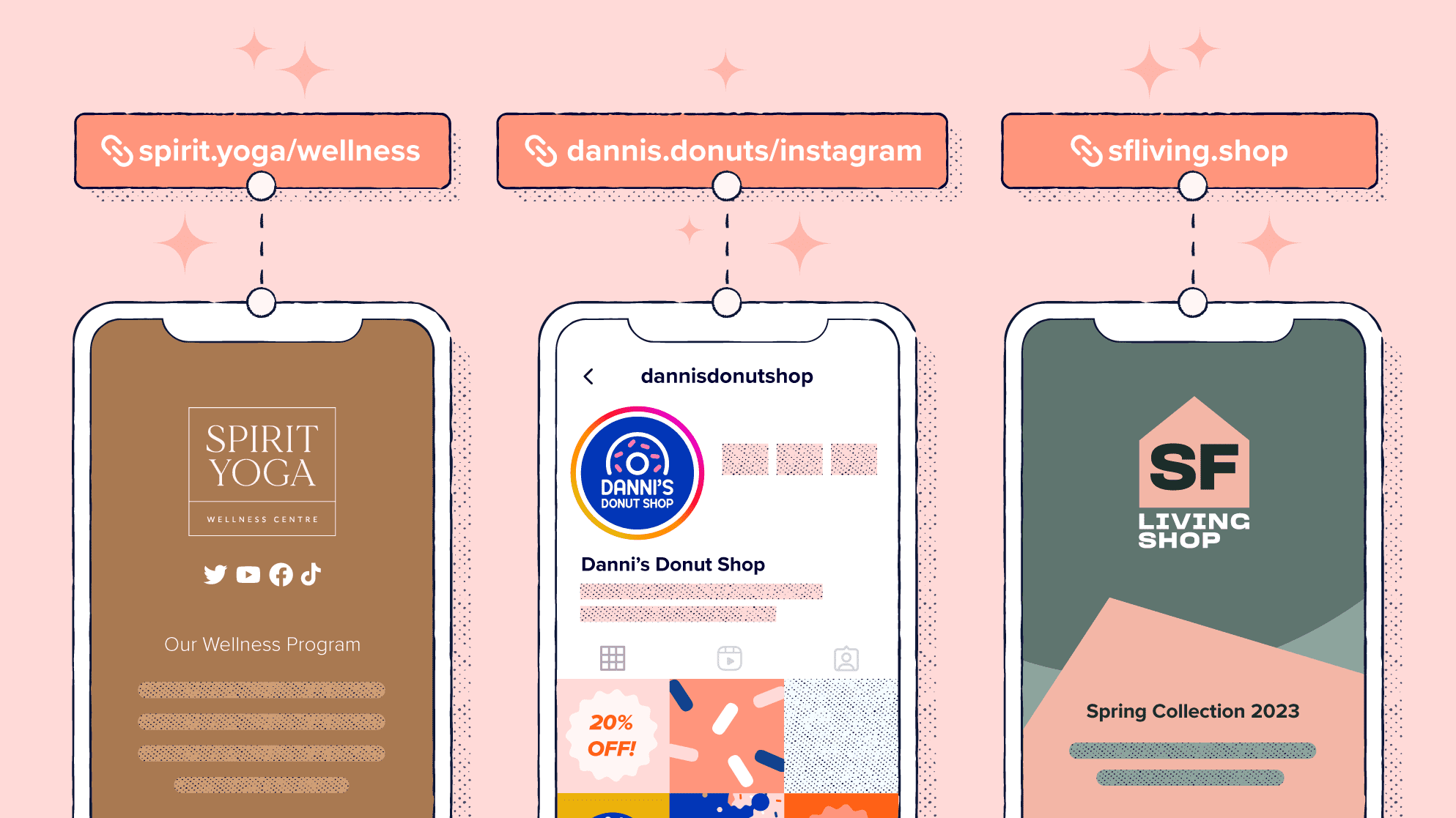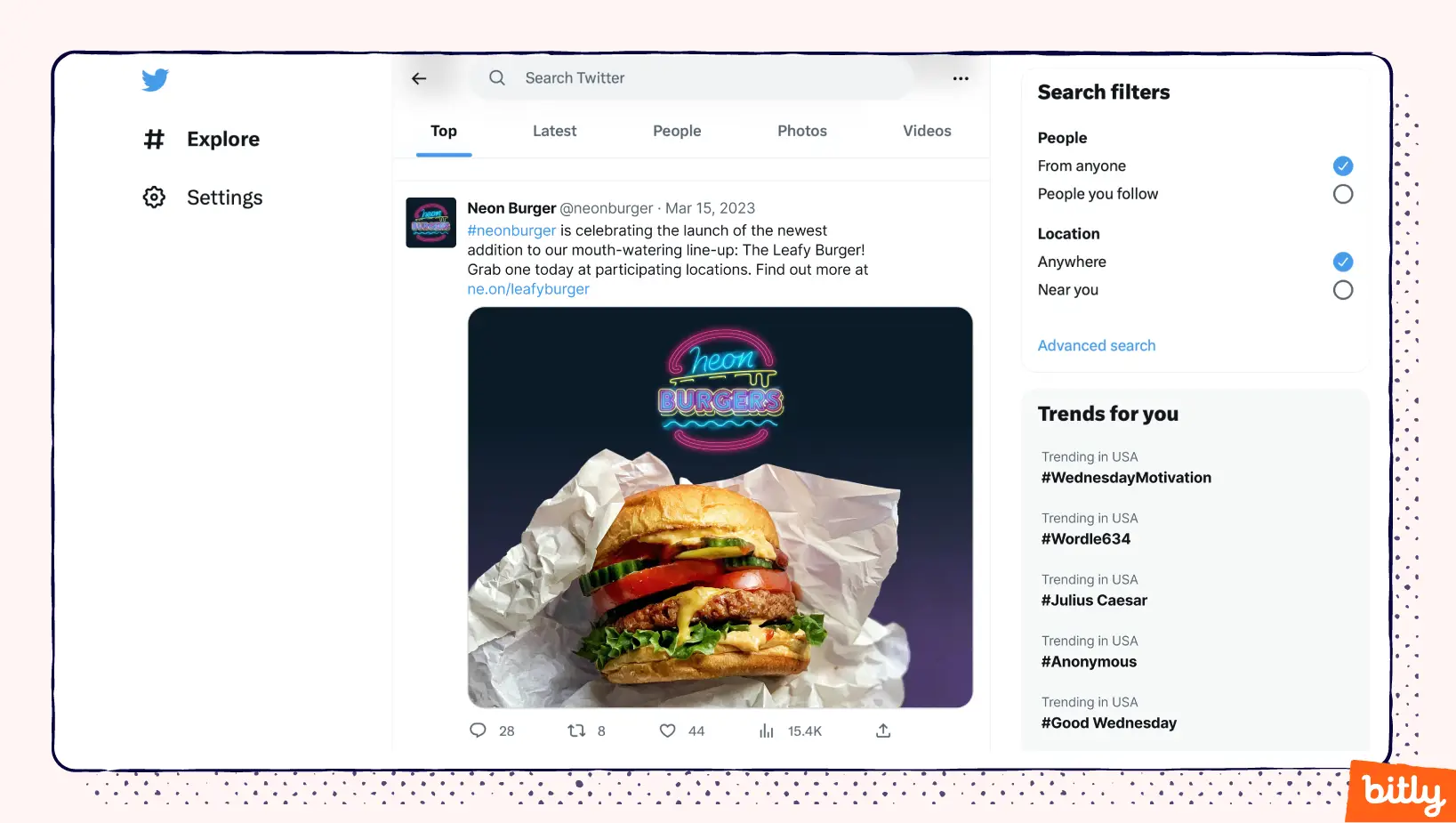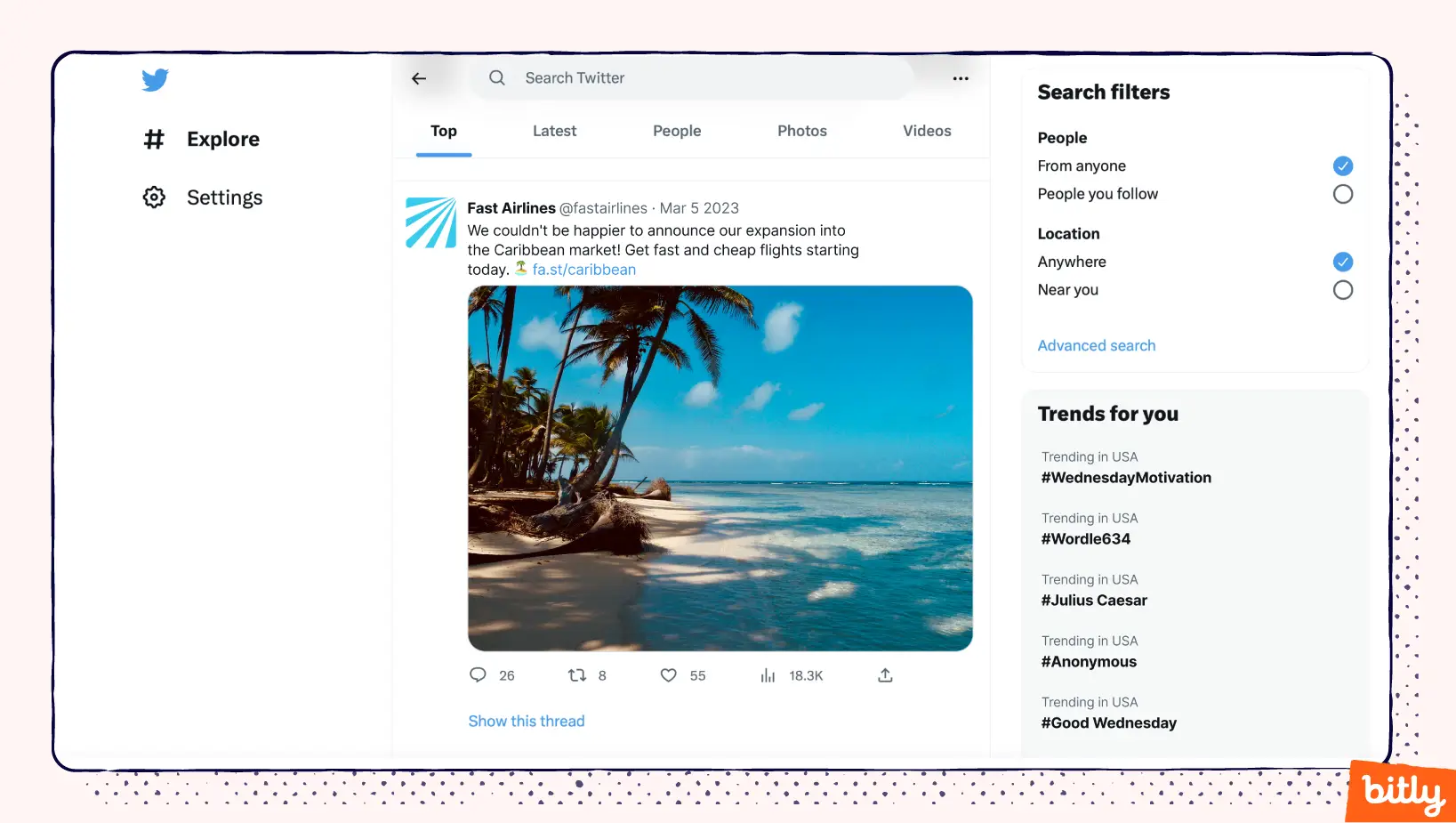
Well-crafted vanity URLs can benefit SEO when implemented correctly. Get insight straight from SEO experts and learn how to build and market your vanity URLs in SEO-friendly ways. Explore best practices and learn how link management tools can boost your ranking.
How do vanity URLs impact SEO?
Experts debate the extent to which a vanity URL can impact SEO. Most agree that vanity URLs can indirectly benefit SEO when you use them thoughtfully.
Vanity URLs are shortened, appealing links that redirect to a more complex URL, such as my.news/pulitzer. They are featured heavily in social media and print advertising. With the rise of vanity URLs in advertising and marketing, a natural question emerges: How do vanity URLs impact SEO?
Lily Ray, Senior Director of SEO and Head of Organic Research at Amsive Digital, points out that “Vanity URLs are not indexed or displayed on search engines. Theoretically, vanity URLs should have no impact on SEO, assuming that the vanity URL is following best practices like a 301 redirect to the original URL.”

Lily Ray, Senior Director of SEO and Head of Organic Research at Amsive Digital.
In this regard, the mere existence of a vanity URL will neither harm nor help SEO. Whether or not the pendulum swings in favor of SEO depends on how you create and use a vanity URL. If you need help setting one up, be sure to check out our guide on how to create a vanity URL.
How do vanity URLs help SEO?
Vanity URLs can help SEO by indirectly generating more traffic to your website. These attractive links make it easier for content creators to find and share your page, boosting your SEO performance.
Any benefit that a vanity URL brings is not a direct consequence of simply creating and using the vanity URL. To gain SEO benefits, you must use this tool with intention and build it with vanity URL best practices in mind.
Here are some of the ways vanity URLs can indirectly benefit SEO:
- Increase click-through rate and inspire referral links
Technically, vanity URLs cannot affect the click-through rate (CTR) on a search engine because sites like Google do not index vanity URLs. However, the experts agree that vanity URLs appeal to the customer and improve the chances of others seeing your content and linking to it.
Senior Director of SEO Lily Ray notes that “because vanity URLs look more appealing than the average URL, it’s quite likely they’ll increase click-through rates on the places where the vanity URL is displayed, like Twitter.”
“This type of visibility can indirectly help your SEO,” adds Andy Crestodina, Chief Marketing Officer and co-founder of Orbit Media Studios. “Although links from Twitter (or any social network) don’t affect your domain authority, if a content creator sees it, loves it, and links to it, that link may pass authority and improve your ranking potential.”

Andy Crestodina, Chief Marketing Officer and co-founder of Orbit Media Studios.
Alec Brownscombe, Technical Director at SEO agency Marie Haynes Consulting, explains, “The more clicks a URL receives, the more likely it is the content will be shared, linked to, and engaged with—all of which can benefit the SEO performance of the content.” Of course, no vanity URL can fix poor content. Brownscombe stresses, “The content itself has to be high quality in the first place. Any click-through benefits one yields won’t matter as much if the content isn’t helpful, inspiring, or memorable for users. “

Alec Brownscombe, Technical Director at SEO agency Marie Haynes Consulting.
- Provide shortened URLs for amplifying your content
Many websites have legacy issues where content is buried under many levels of subfolders making for long, complex URLs that simply can’t be used in social media marking. For example, a long link like https://www.mynewstoday.com/2023/03/12/sports/basketball/usa-australia-championship-finals-2023/ can become my.news/basketball-champs.

- Reduce duplicate content issues
Duplicate content refers to content that appears on multiple unique websites. Search engines have trouble deciding which website should rank higher in these situations.
For example, let’s say you want to advertise an event on your main domain page mynews.com and use a unique promotional link for social media advertising. You could create another subdomain, like newevent.mynews.com, that hosts all the information about the event, but it will compete with replicated information on your main domain page.
Instead, create the vanity URL my.news/newevent to link to the main domain page while promoting the specific event within the vanity URL itself. Using a vanity URL with a 301 redirect means that Google and other search engines pass any ranking to the final webpage destination instead of the vanity URL. In this case, the vanity URL creates stronger relevancy and a signal, but the original domain keeps all the ranking benefits. - Reduce broken links generated from human error
Vanity URLs cannot help links with technical errors. On the other hand, we can all relate to hovering over a gigantic URL, only to miss the last three characters by mistake, leading to an uninspiring “page not found” message. Undoubtedly, some visitors who had minimal interest won’t try the link again. Vanity URLs designed to be more appealing, attractive, and short minimize these human errors, meaning more users land on your website, use the page, promote the content, and improve your ranking. - Increase the use of SEO keywords
Vanity URLs that contain essential keywords can boost your SEO since your brand name will be associated with the keyword. For example, a restaurant named Neon Burger could use the vanity url ne.on/leafyburger for social media promotions of its new vegan burger, the “Leafy Burger”.

- Easy tracking means improved SEO insight
Marketers often use vanity URLs for specific ad campaigns. Tracking those URLs can provide additional data on which content drives the best engagement.
Along with receiving analytics from your link management platform, you can use vanity URLs to cover up long URLs with Urchin Tracking Modules (UTMs) tracking, a simple code that users attach to any URL to generate Google Analytics data. Vanity URLs can provide a shortcut to this less appealing link while still leading users to the URL with built-in UTMs.
For example, https://www.fastairlines.com/fly/new-routes/caribbean-expansion?utm_source=twitter&utm_medium=social&utm_campaign=brand___campaign is simplified to fa.st/caribbean.

Amsive Digital’s Lily Ray describes it this way: “Clicking on a ‘prettified’ Bitly link that directs the user to a version of the URL with UTMs means you get the best of both worlds: a short, appealing user-facing URL, plus accurate tracking in Google Analytics.”
Access to these analytics will be invaluable as you modify campaigns to optimize SEO.
How can vanity URLs hurt SEO?
You have little risk of negatively impacting your SEO if you create and use your vanity URL according to best practices. However, sloppy vanity URLs that don’t include a brand name or use 301 redirects can harm SEO.
Here are a few URL practices that can hurt your SEO:
- Using a vanity URL service that does not provide 301 redirects
301 redirects are permanent redirects that send site users to a different link than the one they originally clicked. Notably, 301 redirects tell search engines to index the original URL, not the vanity URL. Some sources promote the misconception that any redirect can hurt your SEO. However, search engines do not consider 301 redirects for ranking, meaning that the vanity URL will not impact the SEO of the destination URL.
On the other hand, temporary 302 redirects can negatively impact your ranking. In this case, the search engines perceive the redirect as temporary. When faced with a 301 redirect, search engines often respond by splitting the ranking between the vanity URL and the destination URL.
The Fix: When shopping around for link management software, ensure that the platform creates permanent 301 redirects for your links. - Creating vanity URLs without your brand name
Vanity URLs do not necessarily include a brand name. In SEO we always want to build a strong brand that we can leverage for search engine rankings. For example, a cafe can create a Bitly vanity URL with bit.ly as the vanity domain such as bit.ly/reservations. This link may appear slightly odd to people unfamiliar with URL shortening.
The Fix: To mitigate hesitant clicks, ensure your vanity domain includes your brand. This same cafe can create a custom vanity domain cosy.cafe/reservations using Bitly, inspiring trust in users who know that the link leads to a credible business webpage.
5 SEO use cases for vanity URLs
Businesses use vanity URLs in various promotional activities. Let’s walk through five specific marketing situations and see how vanity URLs can impact SEO.
- Vanity URLs and franchises
Businesses that expand operations use vanity URLs for marketing their new franchise while keeping the authority of the brand’s main website. For example, a small food delivery company named Fresh First can create the vanity URL freshfirst.canada that redirects to a subfolder on the main freshfirst.com domain containing information specific to an expansion into the Canadian market.
Otherwise, franchise businesses must create an entirely new website that won’t enjoy the ranking garnered from the main brand’s reputation. Plus, it costs much more to promote and market a new website than build a vanity URL and redirect it to a subfolder or subdomain. - Vanity URLs and multi-disciplinary businesses
Multi-disciplinary businesses can also leverage vanity URLs to avoid creating entirely new domains specific to each part of the business. For example, a fictional running trainer may hire strength training coaches. They could make a subdomain like strength.crushrunning.com that will duplicate much of the content found on the main domain. Instead, they can build a vanity URL to redirect traffic to a subfolder dedicated to the strength training coaches on their original website. - Vanity URLs and new product or service launches
Businesses often use vanity URLs to promote unique campaigns. Each time Neon Burger updates its menu, they can use the domain ne.on/MenuUpdates. This branded link conveys brand identity. - Vanity URLs and traditional advertising
Since vanity URLs are shorter, businesses use them for offline advertising when writing down or memorizing longer URLs can be challenging.
For example, imagine driving by a billboard that advertises a new laptop from your favorite computer company, Pineapple. Below the sleek image of a laptop, the company placed the following link: https://www.pineapplecomputing.com/new-products/laptops/laptop123—an impossible web address to memorize as you speed by. On the other hand, the vanity URL pineapple.laptop is more straightforward, cleaner, and more memorable. The same principle applies to podcast or radio advertisements, where the host quickly notes the sponsor’s vanity URL before moving on to a new topic.
Crestodina of Orbit Media Studios knows firsthand how vanity URLs can impact print advertising. He shares, “Vanity URLs are great for offline marketing. I’m updating my book, Content Chemistry, adding a recommendation to use my content marketing template. Of course, I don’t want the reader to have to type a long URL to get to the page, so I used Bitly to make a shorter URL: bit.ly/chemistrytemplate, creating a powerful indirect SEO benefit. The many marketers and new influencers who read the book are more likely to visit the template, see the value of that page, and link to it from their content. Better visibility (through easier access) means a better chance of links and mentions and better rankings.” - Vanity URLs and social media advertising
Vanity URLs dominate advertising campaigns on social media, where users favor concise text over wordy paragraphs. Credible link management providers offer analytics that follows a user from the platform to your webpage. You can use these metrics to assess the performance of your social media campaign.
Vanity URLs have become particularly popular on Instagram for a good reason: The social media giant only allows users to use one link. In this case, vanity domains can act as marketing tools, with the text calling out the brand and any specific campaign. You can also use vanity URLs to create an appealing landing page for users to explore using Bitly Link-in-bio.
SEO best practices for using vanity domains
Sticking to simple SEO best practices will help your branded links improve SEO. If you incorporate basic rules when writing and setting up your vanity domains, you won’t have to worry about negative SEO impacts.
Follow these SEO tips when writing a vanity domain:
- Shorter is better
According to Backlinko, the URLs that dominate search results have 9.2 fewer characters than those that fall behind. Length isn’t everything, a lot of vanity URL sites will shorten your link, but customization can also help get the point across. For example, bit.ly.com/StartNow is more compelling than bitly.com/ahf81n. - Capitalization is key
Capitalizing the first letter of each word makes your vanity URLs easier to read. - Don’t use special symbols
Em dashes, currency designations, and other special characters may look interesting, but your audience may neglect to type them and never get to your page.
SEO best practices for setting up vanity URLs include:
- Create permanent 301 redirects
Alec Brownscombe at Marie Haynes Consulting summarizes the importance of 301 redirects best. He explains, “301 redirects should be kept in place permanently for many reasons, one being that users could come across the vanity URL years later even after a particular campaign may be over. There is also a possibility another site could link to your content with the vanity URL through no control of your own; you want the passage of link equity to remain in place forever. A URL link management service such as Bitly will store the redirects permanently.” - Make sure the vanity URL comes with tracking services
Reputable link management providers should track all the relevant metrics for your link. Otherwise, you might have unclear traffic coming from the vanity URL, which will cloud your understanding of user engagement.
“When it comes to vanity URLs and SEO, choosing your link management provider is an important decision,” says Bitly Chief Technology Officer Raghu Srinivasan. “Link management companies that are new and haven’t been around very long could potentially shut down, and your 301 redirects along with them. Instead, pick a trusted provider like Bitly, which has been around for over 14 years. We translate any click or tap on your URL into data on usage, traffic, location, and more. Essentially, we give you the user data that can help you improve your SEO and marketing efforts.”
Use Bitly for SEO-friendly vanity URLs
To manage vanity URLs alongside SEO efficiently, you need a link management service that offers permanent redirects, custom branding tools, and powerful analytics so that you can transform your links into SEO-building assets.
Bitly issues 301 redirects for all links and never re-uses or modifies shortened URLs. So, any vanity URL you create with Bitly will be permanently tied to the webpage you choose, eliminating any SEO redirect issues.
Bitly’s custom branding solution makes it easy to replace “bit.ly” with your chosen vanity domain name, inspiring confident clicks, and instant recognition. With Bitly’s custom vanity domains, users will never mistake your links for troublesome spam.
Robust Bitly analytics provide comprehensive metrics like clicks, geographic data, and referring channels that allow you to track engagement from specific campaigns. Finally, Bitly’s seamless integration means that you can consider these statistics along with other analytic tools to finetune your perfect SEO strategy.
It’s no wonder that trusted brands around the world use Bitly for their link management needs. Join these top-ranked brands and create custom-branded links that will help your site land the rank it deserves. Visit the Bitly pricing page to learn more about the plans we offer and how they can take your SEO to the next level.